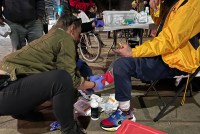Latest KFF Health News Stories
Mark Cuban Has Been Taking On the Drug Industry. But Which One?
The billionaire entrepreneur and NBA team owner is making waves with his new drug company. But his generics aren’t always the lowest-priced deal.
Venden opioides mezclados con tranquizilantes para animales en vecindario de Philadelphia
Los traficantes utilizan xilacina, un sedante barato no autorizado, para cortar el fentanilo, un opioide sintético 50 veces más potente que la heroína. El nombre callejero de la xilacina es “tranq”, y el fentanilo cortado con xilacina se llama “tranq dope”.
As Opioids Mixed With Animal Tranquilizers Arrive in Kensington, So Do Alarming Health Challenges
The veterinary tranquilizer xylazine, the choice du jour of local drug dealers to cut fentanyl, leads to necrotic ulcers and leaves street medics and physicians confused about how best to deal with this wave of the opioid crisis.
What the Health? From KFF Health News: A Health-Heavy State of the Union
President Joe Biden’s 2023 State of the Union address leaned heavily on health care issues. Biden took a victory lap for recent accomplishments like capping prescription drug costs for seniors on Medicare. He also urged Congress to make permanent the boosted premium subsidies under the Affordable Care Act, and he sparred with Republicans on threats to cut Social Security and Medicare. Also this week, both sides in the abortion debate are bracing for a court decision out of Texas that could, at least temporarily, make the abortion pill mifepristone illegal nationwide. Alice Miranda Ollstein of Politico, Rachel Cohrs of Stat, and Sarah Karlin-Smith of the Pink Sheet join KHN chief Washington correspondent Julie Rovner to discuss these issues and more. Also this week, Rovner interviews Kate Baicker of the University of Chicago about a possible middle ground in the effort to get universal health insurance coverage.
Centene Agrees to $215 Million Settlement With California for Alleged Medicaid Overbilling
The nation’s largest Medicaid insurer denies wrongdoing after the California attorney general’s office investigated it for inflating prescription drug costs.
‘We Ain’t Gonna Get It’: Why Bernie Sanders Says His ‘Medicare for All’ Dream Must Wait
As he takes the reins of the Senate Health, Education, Labor & Pensions Committee, the independent from Vermont and implacable champion of “Medicare for All” maps out his strategy for negotiating with Republicans — and Big Pharma.
NY requiere que doctores receten naloxona a algunos pacientes que toman analgésicos opioides
Aunque los titulares son por las muertes por sobredosis de drogas ilícitas vendidas en la calle, el riesgo de sufrirlas también es real para los pacientes que toman opioides recetados por sus médicos.
NY Docs Are Now Required to Prescribe Naloxone to Some Patients on Opioid Painkillers
This strategy — now in place in at least 10 states — is part of an effort to curb accidental opioid overdose deaths by patients who take these powerful medications.
Journalists Recap Coverage of Gun Violence, Drug Imports, and Mental Health
KHN and California Healthline staff made the rounds on national and local media this week to discuss their stories. Here’s a collection of their appearances.
Estados desafían a Biden a que baje precios de medicamentos permitiendo importaciones desde Canadá
En Estados Unidos se pagan unos de los precios más altos del mundo por los productos farmacéuticos de marca. Los medicamentos son generalmente menos caros en el vecino Canadá, donde el gobierno controla los precios.
States Challenge Biden to Lower Drug Prices by Allowing Imports From Canada
Colorado has joined Florida, New Hampshire, and New Mexico in seeking federal permission to import prescription drugs from Canada. President Joe Biden endorsed the approach in his 2020 campaign but has yet to approve any state plan.
KHN’s ‘What the Health?’: Congress Races the Clock
Sen. Raphael Warnock’s re-election in Georgia will give Democrats a clear-cut Senate majority for the first time in nearly a decade. Meanwhile, the current Congress has only days left to tackle major unfinished business on the health agenda, including fending off scheduled pay cuts for doctors and other health providers in the Medicare program. Joanne Kenen of the Johns Hopkins Bloomberg School of Public Health and Politico, Anna Edney of Bloomberg News, and Sandhya Raman of CQ Roll Call join KHN’s Julie Rovner to discuss these topics and more. Plus, for extra credit, the panelists recommend their favorite health policy stories of the week they think you should read, too.
Journalists Discuss Medicaid Rules, Opioid Settlement Funds, and the Public Health Workforce
KHN and California Healthline staff made the rounds on national and local media this week to discuss their stories. Here’s a collection of their appearances.
Para lanzar un nuevo fármaco al mercado, la Administración de Alimentos y Medicamentos (FDA) exige a las farmacéuticas estudios exhaustivos para demostrar su seguridad y eficacia. Conseguir que un medicamento salga al mercado unos meses antes, y con menos gastos de lo habitual, puede traducirse en beneficios millonarios para el fabricante.
The Business of Clinical Trials Is Booming. Private Equity Has Taken Notice.
Private equity-backed Headlands Research heralded its covid-19 vaccine trials as a chance to boost participation among diverse populations, then it shuttered multiple sites that conducted them.
Defense Department Health Plan Cuts Its Pharmacy Network by Nearly 15,000 Outlets
Many of the pharmacies were small, independent operations that had decided not to participate next year because of the lowered reimbursement being offered. But they were surprised by an early dismissal, and some patients with specialized drug needs could face difficulties in the transition.
KHN’s ‘What the Health?’: Biden Hits the Road to Sell Democrats’ Record
With the midterm elections rapidly approaching, President Joe Biden has taken to the road to convince voters that he and congressional Democrats have delivered for them during two years in power. Among the health issues highlighted by the administration this week are pandemic preparedness and the availability of over-the-counter hearing aids. The president also promised to sign a bill codifying the abortion protections of Roe v. Wade if Democrats maintain control of the House and Senate — even though it’s a long shot that there will be enough votes for that. Sarah Karlin-Smith of the Pink Sheet, Sandhya Raman of CQ Roll Call, and Mary Agnes Carey of KHN join KHN’s Julie Rovner to discuss these topics and more. Plus, for extra credit, the panelists recommend their favorite health policy stories of the week they think you should read, too.
Pharma-Funded FDA Gets Drugs Out Faster, But Some Work Only ‘Marginally’ and Most Are Pricey
Since pharmaceutical companies started funding their FDA drug applications 30 years ago, the agency’s reviews have gone much faster — perhaps too fast.
Médicos se apresuran a usar fallo de la Corte Suprema para liberarse de cargos por opioides
En una decisión de junio, el tribunal dijo que los fiscales no solo deben probar que una receta no estaba médicamente justificada sino también que el que la escribió sabía del riesgo de recetar opioides.
Doctors Rush to Use Supreme Court Ruling to Escape Opioid Charges
After a unanimous ruling from the high court, doctors who are accused of writing irresponsible prescriptions can go to trial with a new defense: It wasn’t on purpose.


















